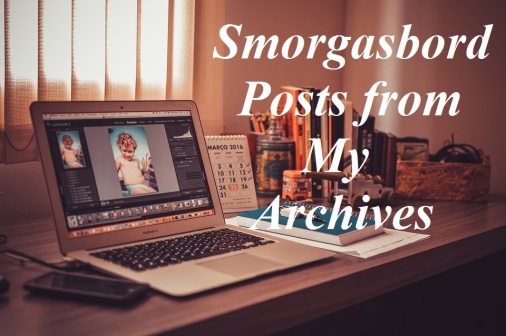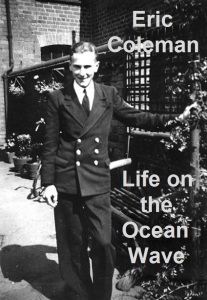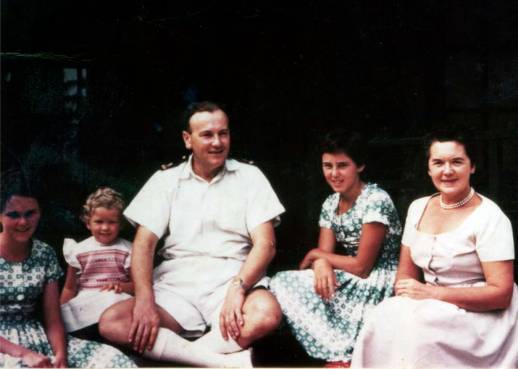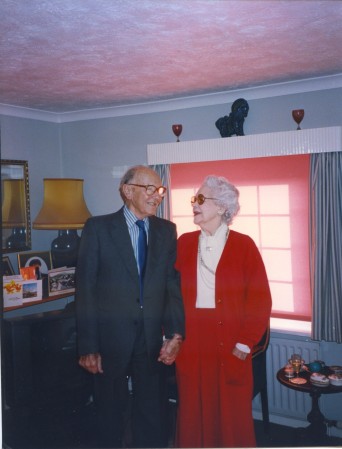
As part of the series of Posts from Your Archives which is focused on family, I thought I would share two series from my own archives from 2016. One is my father’s memoir about his life in the Royal Navy that we persuaded him to write two years before his death in 1996, Life on the Ocean Wave.
The other series is the first book, The Colour of Life, we published for my father-in-law Geoff Cronin, who sadly died in 2017 at age 93.
Both were great raconteurs and I hope you enjoy reading their exploits.
After a very brief respite after the war ended my father was back in the fray again in the Far East. Not before a disruptive move back and forth to Malta. I will hand you over to Eric to carry on with his story.

HMS Collingwood
The Electrical Branch of the Royal Navy was formed in 1946 and Collingwood was selected as the Headquarters, and School, for the New Branch. I was very lucky to be in Collingwood at this time of change and after about six months in an office it was decided to form a Radio section and there was a requirement for Radio Electrical Artificers. The first conversion class (REA 1) was made up of myself and one other CEA., three senior EA’s and eighteen newly qualified artificer apprentices. It was a long course, almost two years, spent mostly in Collingwood with a short spell in HMS Mercury. This period was the first time since we married in 1940 that Mollie and I were able to enjoy a normal married life. Shortly after the course finished, I decided to take the examination for promotion to Warrant Radio Electrical Officer, which I duly passed, and was promoted on 4th December 1948.
I remained in Collingwood for courses etc. and received my first appointment to join HMS Triumph on 1st March 1949.
HMS Triumph
Triumph was completing a commission in the Mediterranean, based in Malta, and I travelled out to join her in a passenger ship that sailed from Liverpool. Shortly after joining, we sailed for the UK to re-commission. We spent only a few days in Sheerness during which time Mollie came to Chatham for a short time. Back to Malta with lots of exercising and training and with the prospect of a two-year commission in the Med. Mollie and I decided to move the family to Malta, which went very well. After settling in, we were told that the ship was to leave for the Far East within the next few weeks. This was a very sad time but Mollie faced it in true naval wife style and when we sailed the family’s return passage had not been arranged. They eventually got home in a small cargo ship that took twelve passengers. I think they enjoyed it. Meanwhile we were heading east, with stops at Aden, Colombo, Singapore and finally we reached our destination, Hong Kong.

HMS Triumph – Wikipedia
We had only been in harbour a few days when a typhoon was reported in the area and in true naval fashion we sailed, to ride it out to sea. It was the worst experience I was ever to meet at sea. The ship did everything except sink and how it avoided that I don’t know. We survived and returned to harbour and spent some days clearing up the damage. There followed an extensive period of training and exercising with RN and US Navy ships and early in 1950 we sailed to Japan for a long visit.
We went into the inland sea and tied up in Kure, the main Japanese Naval Base. The Americans and Australians were very much in occupation and conditions were such that fraternizing with the Japanese was still frowned upon. Japan is a lovely country and being there in the spring it was at its best. The climate has both extremes, very cold in the winter and hot in the summer. We continued with training, with visits to other ports. We saw Hiroshima and at that time most of it was still devastated and it was a horrible example of nuclear war.
The time came for us to return to Hong Kong, in June 1950. As we left the inland sea we received instructions to return to Kure to take on stores etc. and then we sailed to the US Base in the Philippines where we joined up with the US Boxer, an American Carrier. Then, after all night meetings, we sailed to join in the Korean War.
The Korean War.
Boxer went to the east coast of Korea and we to the west coast, where our aircraft were quickly in action. We operated from Sasebo, a port in Japan and we were continually providing air support until October 1950 when we ran out of aircraft, mainly Seafires, our fighter aircraft ‑ our flight deck was not strong enough to operate the heavier Sea Furies.
We sailed for the UK, arriving in early November 1950. After leave, I was appointed to HMS Vengeance where I served until 10th September 1951 and then to yet another sea job, HMS Solebay, the Leader of the 5th Destroyer Squadron. I was promised only a short time in this job in view of my long time at sea ,and away from home, and, true to their word, I was appointed to HMS Mercury, the Communications School at Leydene House, on 3rd March 1952.
Lt. Commander Herbert Eric Coleman – January 12th, 1916 – April 5th 1996

As a family we travelled to Sri Lanka, still Ceylon in 1954 until 1956, followed by two years in Malta 1959 to 1961, and two years in South Africa from 1963 to 1965. So we as a family all enjoyed life on the ocean wave.

Ceylon 1956
I hope you have enjoyed this part of my father’s memoirs – he rarely talked about his time in both wars and I think you have to read between the lines at times to understand that despite his brevity, he saw and experienced things that he still could not share. He lost his best friend, Vic Newell, which must have been a huge blow and he left ships that would later be sunk with great loss of life. That has to leave its mark.
I am so glad that we managed to get him to write his potted history of his life during the war years. He did write more in his memoirs about the rest of his career which took us all over the world, retiring from active duty in 1971 but returning as a reserve officer for another ten years until the age of 65. His role in that capacity involved being responsible for trials on weaponry on ships built for foreign navies, and my mother was lucky to accompany him on some of his trips abroad.
We assume that our grandparents and parents are going to be with us for ever and put off asking them to detail their own and their parent’s history. I think it is important that these stories are passed on before they are lost forever.

Eric and my mother Mollie on his 80th birthday in January 1996, a milestone he was determined to reach.

Pingback: Smorgasbord Blog Magazine Weekly Round Up – 10th – 16th May 2020 – Relationships, ABBA, Ink Fish, Italian Tomato Sauce, Books and Laughter | Smorgasbord Blog Magazine
Wonderful story, Sally!
LikeLiked by 1 person
Thank you Jennie..hugsx
LikeLiked by 1 person
You’re welcome, Sally! 🙂
LikeLiked by 1 person
Your mother must have been a very strong woman to have carried out her role as Navy wife with such grace.
LikeLiked by 1 person
It had its up side too as living abroad and even my father was stationed in the UK there was a rich social life. But it was isolating and tough with four children when he was away for two years at a time.. xx
LikeLike
Amazing history in your family Sal. Your father must have had lots of medals, and your mother a trooper for traveling around the globe with you 3. ❤
LikeLiked by 2 people
Thanks Debby.. he had a few and my sister has them.. mostly campaign medals..♥♥
LikeLiked by 2 people
Beautiful ❤
LikeLiked by 1 person
A wonderful story, Sally, all the better because it is a true one. Being active in the military during a war would be very emotionally taxing.
LikeLiked by 2 people
My father said that he had a job to do and people depended on him to do it right. When I think of his age at the time still in his 20s, a young father with two children and away for two years at a time.. I know my mother found it very difficult, especially the long time between letters. At least today they have internet aboard ships and can be in touch much more consistently.. xx
LikeLiked by 2 people
I am sure he had so much more to tell but couldn’t and as you say, we have to read between the lines – as in “providing air support until October 1950 when we ran out of aircraft”. How many pilots lost their lives? And did your dad know them all personally? I’m sure he must have.
LikeLiked by 2 people
They would have likely shared a mess and as you say, much between the lines. xxx
LikeLiked by 2 people
Fantastic story, Sally. How wonderful to have lived in Sri Lanka, Malta and South Africa. I loved that family photo. Toni x
LikeLiked by 1 person
It was an interesting childhood Toni and set the scene as a nomad for most of my life…hugsxx
LikeLiked by 1 person
Beautiful story, Sally. Thank you.
LikeLiked by 1 person
Thank you John..hugsx
LikeLiked by 1 person